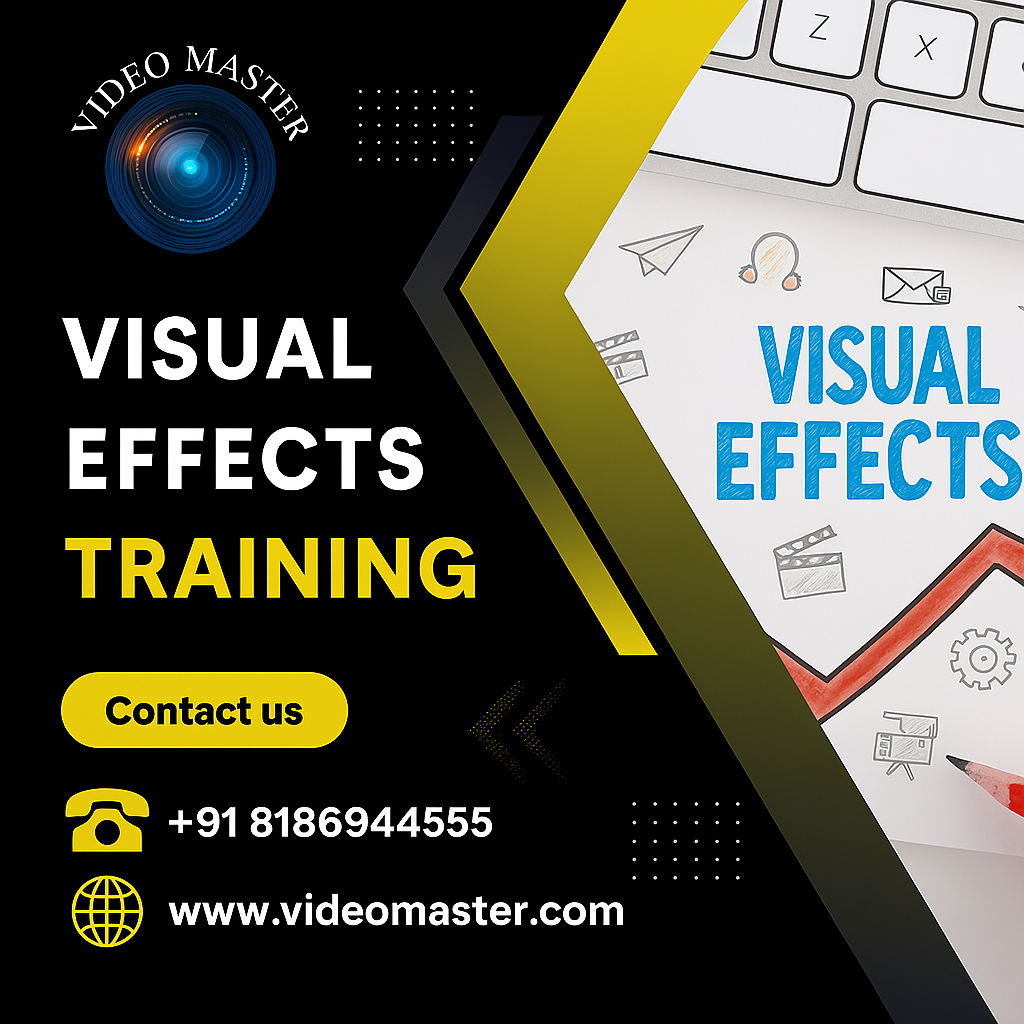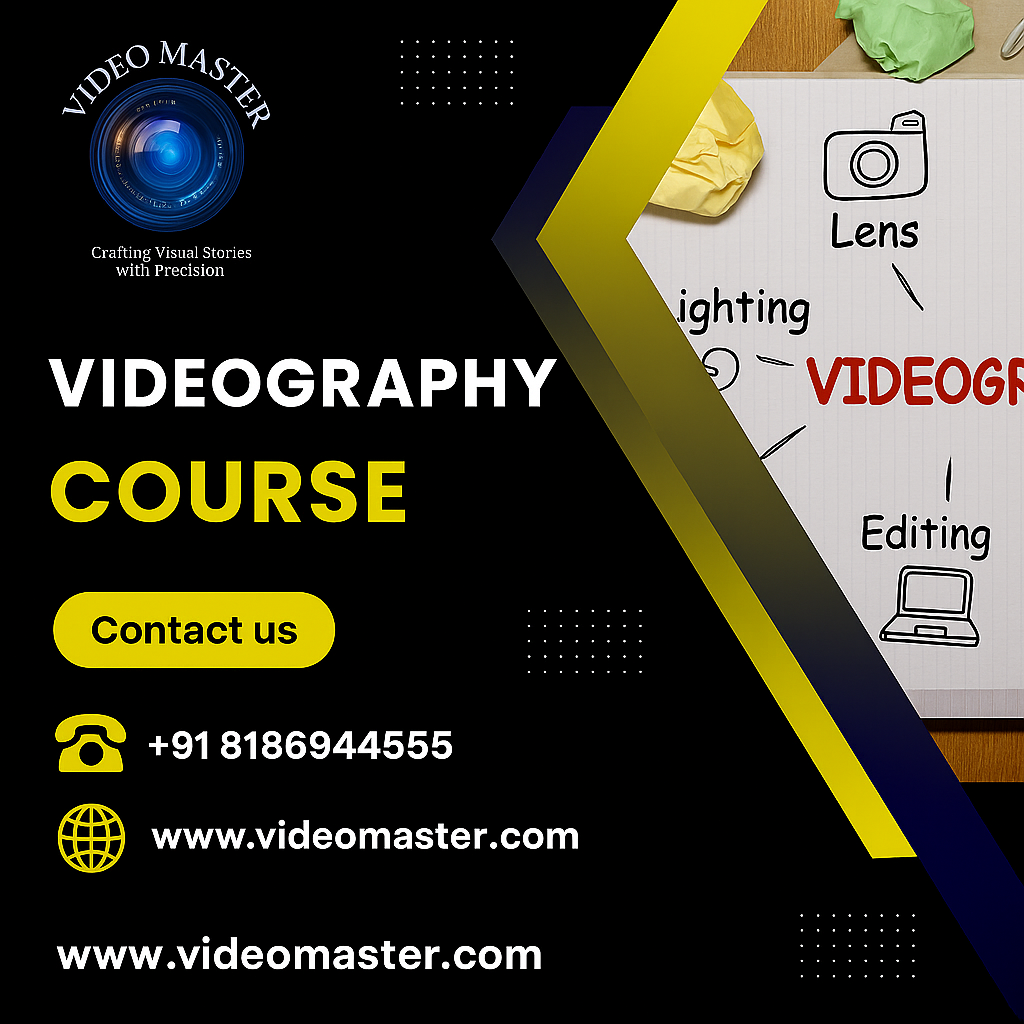WITH
100% Placements & Internships
Online | Class Room | 3 Months | Real Time Projects | Internship Until You are Placed
Visual Effects Training in Hyderabad
Trainer Name | Mr. Sudheer |
Trainer Experience | 15+ Years |
Next Batch Date | 23rd June 2025 (10:00 AM IST) (Offline) 23rd June 2025 (10:00 AM IST) (Online) |
Training Modes | Offline, Online Training (Instructor Led) |
Course Duration | 3 Months |
Call us at | +91 81869 44555 |
Email Us at | videomaster@gmail.com |
Demo Class Details: |
Batch Details
Visual Effects at VideoMaster
Why Learn
- High Demand in the Entertainment Industry
- Creative Expression & Storytelling
- Career Opportunities & Global Scope
- Technology & Innovation
- Freelance & Remote Work Flexibility
- Enhance Multimedia and Video Editing Skills
- Contribute to Cutting-Edge Projects
- Great for YouTube and Content Creators
- Collaborative and Diverse Work Environment
- Lucrative Income Potential
VIsual effects Training in Hyderabad
Curriculum
Module 1: Introduction to VFX & Industry Overview
Understanding VFX: Definition, history, and future
VFX in films, games, advertising, and OTT
Pipeline workflow and roles in VFX production
Real-world case studies (Hollywood/Bollywood)
Career paths and required skills
Module 2: Fundamentals of Design & Storyboarding
Principles of visual design for VFX
Concept development and idea visualization
Storyboarding techniques and tools
Camera angles and cinematic language
Storytelling through VFX planning
Module 3: Adobe Photoshop for VFX
Image editing and retouching for matte painting
Layering and masking for compositing
Texture creation and digital painting
Designing backgrounds and skies
Exporting assets for VFX
Module 4: Rotoscoping Techniques
Introduction to rotoscoping
Using Mocha and After Effects for masking
Creating clean plates and isolating objects
Advanced edge refinement techniques
Roto for live-action integration
Module 5: Green Screen & Chroma Keying
Setting up a chroma key shoot
Lighting techniques for clean keying
Keying in Adobe After Effects and Nuke
Spill suppression and edge refinement
Background replacement and matching
Module 6: Tracking & Matchmoving
2D tracking using After Effects and Mocha
3D camera tracking in Nuke/Blender
Stabilization and motion tracking
Placing elements in moving footage
Matchmoving principles for realism
Module 7: Compositing Basics
Layer-based vs. node-based compositing
Introduction to Adobe After Effects and Nuke
Blending modes, color correction, and keying
Creating seamless integration of elements
Compositing live-action with CG/VFX
Module 8: Advanced Compositing Techniques
Multi-layered composition projects
Working with render passes
Depth maps, motion blur, and light wrap
Set extensions and environmental effects
Creating final VFX shots
Module 9: Motion Graphics Integration
Introduction to motion design in VFX
Animated titles and HUDs
Motion tracking graphics into scenes
Kinetic typography and transitions
Combining VFX and motion graphics
Module 10: 3D for VFX (Basics of Blender/Maya)
Interface and navigation of Blender/Maya
3D modeling fundamentals
Applying materials and shaders
Lighting and camera setups
Exporting 3D assets for compositing
Module 11: Dynamic Effects & Simulations
Creating particle systems (fire, smoke, rain)
Using simulation tools like Blender or Houdini
Explosions, destruction, and water effects
Realistic physics-based simulations
Integration with live footage
Module 12: Digital Matte Painting
Techniques for creating realistic environments
Combining photos, paintings, and renders
Projection mapping basics
Creating set extensions
Scene depth and perspective tricks
Module 13: Color Grading & Look Development
Importance of color in storytelling
Color correction vs. grading
LUTs and film looks
Matching elements across shots
Using DaVinci Resolve/After Effects
Module 14: VFX for Games & Real-Time Engines
Real-time VFX vs. film VFX
Intro to Unreal Engine/Unity for VFX
Particle systems in games
VFX shaders and real-time lighting
Exporting and optimizing for games
Module 15: Final Project & Showreel Creation
Planning and executing a complete VFX shot
Working with real footage and CG
Creating a professional demo reel
Portfolio building and online presence
Preparing for industry interviews

Visual effects Training in Hyderabad
Key Highlights
- Trainer Expertise
The course is led by seasoned VFX professionals with extensive industry experience. They bring real-world knowledge and hands-on techniques, ensuring students gain practical insights into visual effects production.
- Hands-on Experience
Learners develop practical VFX skills through interactive, project-based sessions. This experiential learning approach enhances their ability to apply theoretical knowledge to real-world creative challenges.
- Customized Content
Course content is tailored to suit the individual goals and skill levels of participants. This personalized approach ensures relevance, allowing learners to focus on key areas like compositing, motion tracking, and 3D integration.
- Job Placement Assistance
We provide dedicated job placement support, helping students transition into the VFX industry. Services include resume development, interview coaching, and connections with studios and production houses.
- Affordable Price
Our program is competitively priced, making professional VFX training accessible without compromising on quality. Learners can gain top-tier education without financial strain.
- Live Projects
Students participate in live VFX projects, applying what they’ve learned to real production environments. These projects simulate studio workflows, preparing them for industry demands.
Visual effect in Hyderabad
Reviews
Satish R
I had no prior experience with VFX, but the trainers at VideoMaster were incredibly patient and explained everything clearly. I picked up the concepts quickly, and I’d highly recommend their VFX training program.
Shalini M
The training was very practical and hands-on. I learned a lot of useful techniques used in real VFX production. The instructors were experienced and always available to help during the training at VideoMaster.
Raj G
What I appreciated most about the VFX course at VideoMaster was the customized content. They tailored the training to match my creative goals, and it definitely exceeded my expectations.
Arjun P
Even though I had some VFX experience before, the advanced program at VideoMaster took my skills to the next level. The trainers were up-to-date with the latest VFX trends and shared extremely valuable industry insights.
Eligibility Criteria
01. Educational Qualification:
No particular degree is needed; a basic educational background is adequate. The course welcomes individuals from various academic backgrounds and education levels.
2. Basic Computer Skills
Knowing the basics of computer operations like managing files and using basic software is essential. While being skilled in common computer applications is helpful, it’s not a requirement.
03. Internet Savvy
Being at ease with browsing the internet and using web browsers is important. Additionally, having a basic understanding of online platforms and services is beneficial.
Having the capacity to understand basic concepts in online advertising and digital marketing is crucial. It’s also important to be open to learning and exploring new ideas within the digital realm.
5. Communication Skills
The ability to express ideas and ask questions clearly.
6. Analytical Thinking
Having basic analytical skills to interpret data and metrics related to online advertising is important. It’s also crucial to be open to analyzing and adjusting strategies based on performance.

visual effects Training in Hyderabad

Certification
- VideoMaster - Course Certification
- Visual effect- Course Certification
Visual Effect Course in Hyderabad
Modes
Classroom Training
- Face-to-face instruction by certified trainers.
- Interactive learning environment.
- Hands-on exercises and practical demonstrations.
- Scheduled sessions with fixed timings.
- 100% Placement assistance
- Interview Guidance
Online Training
- Basic to Advanced Level
- Self-paced learning accessible through the internet.
- Daily recorded videos
- Online support for any queries or assistance needed.
- Lifetime whatsapp group
- Interview Guidance
- 100% Placement assistance
Video Training (Self-Paced)
- Basic to advanve level
- Daily recorded videos
- Pause, rewind, and replay options for better understanding.
- Affordable and cost-effective compared to other modes.
- Will keep updating with New videos as course topics change.
- Interview Guidance
Visual effect Training Course in Hyderabad
Salaries
VFX Fresher Salary in Hyderabad
The salary of a VFX fresher in Hyderabad typically ranges from ₹2.0 Lakhs to ₹3.5 Lakhs per year, depending on the studio, individual skills, and educational background. As freshers gain more hands-on experience, certifications, and a strong portfolio, they can expect their salary to grow steadily.
VFX Artist Salary Range:
In Hyderabad, the salary range for a VFX Artist varies from ₹2.0 Lakhs to ₹8.5 Lakhs per annum, with an average annual salary of ₹5.5 to ₹6 Lakhs. VFX professionals are in high demand due to the booming entertainment, gaming, and OTT industries. Their expertise helps bring creative visions to life in films, TV, and digital media.
How to Become a VFX Artist:
To become a VFX artist, pursue certification through a reputed institute like Digital Brolly or Arena Animation, and gain practical experience by working on real-time projects or short films. Constantly upgrade your skills in tools like Adobe After Effects, Autodesk Maya, Nuke, and Houdini, and build a professional portfolio to showcase your work.
High-Level Salaries in VFX:
The highest salaries in VFX are seen in roles such as VFX Supervisor, Creative Director, or Head of Post-Production. These professionals can earn more than ₹1.5 crore per annum, especially when working with international studios, large-scale movie productions, or in senior leadership roles at major VFX companies. Compensation may also include project bonuses, overseas allowances, and royalties.
FAQ'S
1. What is Visual Effects (VFX)?
VFX refers to the process of creating or manipulating imagery outside of a live-action shot. It includes techniques like compositing, CGI, green screen, motion capture, and more to create realistic or fantastical visuals in films, TV, games, and advertisements.
2. What are the career options in VFX?
Some popular career roles include:
VFX Artist
Compositor
Motion Graphics Designer
3D Animator
Roto Artist
Matchmove Artist
VFX Supervisor
3. What skills are required to become a VFX artist?
To succeed in VFX, you need:
Creativity & storytelling sense
Strong understanding of visual composition
Knowledge of software like After Effects, Maya, Blender, Nuke, Houdini
Attention to detail
Time management and teamwork skills
4. Which software is used in VFX?
Commonly used VFX tools include:
Adobe After Effects
Autodesk Maya
Nuke
Blender
Houdini
Cinema 4D
Adobe Premiere Pro
5. How long does it take to learn VFX?
It depends on the depth of learning. A short course may take 3 to 6 months, while a full diploma or degree course can take 1 to 3 years. Real mastery comes from practice and project work.
6. Is VFX a good career option in India?
Yes, VFX is a booming field in India with increasing demand due to OTT platforms, gaming, animation, and film industries. Major studios and international projects are outsourcing VFX work to India, creating more job opportunities.
7. What is the salary of a VFX artist in India?
Freshers: ₹2.0 – ₹3.5 Lakhs per annum
Mid-level: ₹4 – ₹7 Lakhs per annum
Experienced/Supervisors: ₹10 Lakhs+ per annum
Top roles can go up to ₹1.5 crore annually based on experience and company.
8. Do I need a degree to become a VFX artist?
No, a formal degree is not mandatory. Many artists build successful careers through certification courses, portfolios, and practical experience. However, a degree can add value if you want to work abroad or in structured studios.
9. Can I learn VFX online?
Yes. Many platforms offer online VFX courses, such as:
Udemy
Coursera
FXPHD
YouTube tutorials
Specialized training centers like Digital Brolly, Arena Animation, MAAC (some offer online modules)
10. What’s the difference between VFX and animation?
Animation involves creating moving images from scratch (characters, objects).
VFX blends real footage with computer-generated imagery to enhance or create scenes.
Other Relevant Courses

Adobe lllustrator

VideoGraphy Course

PhotoGraphy Courses
